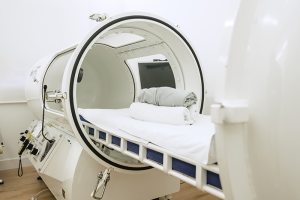AHA partnering with states to respond to Hurricane Harvey, infrastructure issues
AHA partners with states to respond to Hurricane Harvey, infrastructure issues
The American Hospital Association (AHA) is working with the Texas and Louisiana hospital associations in relief efforts to assist those affected by Hurricane Harvey.
The hurricane, which has flooded many parts of Houston and surrounding areas, so far has resulted in 39 deaths. President Donald Trump issued a major disaster declaration for areas affected by the hurricane, allowing federal resources to flow into the area to help in state and local relief efforts.
The AHA has been in contact with state hospital associations to serve as a liaison with federal relief agencies. In addition, the American Society for Healthcare Engineering (ASHE), an AHA personal membership group, also has been in contact with several members to provide assistance to specific hospital infrastructure issues as they arise. In addition, ASHE will coordinate with hospital engineers throughout the country to provide materials and share expertise to ensure that facilities are functional and safe for patients.
The Texas Hospital Association has established a hospital employee assistance fund for those who wish to donate.
ASPR updates hurricane preparedness resources
In the wake of Hurricane Harvey, the Assistant Secretary for Preparedness and Response has updated its list of hurricane-related resources for health care stakeholders.
The list includes planning tools and key lessons learned from adverse-weather events, and detailed resources specific to various health care professions and settings, such as dialysis centers, pharmacies, behavioral health specialists and emergency management and facility professionals.
The list was updated Aug. 28. Updates include the Centers for Disease Control and Prevention’s (CDC's) 2017 hurricane cleanup and remediation guidelines, as well as a CDC checklist that was developed after Hurricane Sandy to ensure resilience in the built environment.
FDA sends notice to hospitals on forced-air thermal regulating systems
The Food and Drug Administration (FDA) sent a notice this week to health care providers recommending the use of thermoregulating devices for surgical procedures when clinically warranted. This applies to forced-air thermal regulating systems as well, which use an electrical blower to circulate filtered, temperature-controlled air through a hose into a blanket placed over or under a patient.
The FDA states that it became aware that some health care providers may be avoiding the use of forced-air thermal regulating systems during surgical procedures due to concerns of potential increased risk of surgical-site infection (SSI). The FDA notes that using forced-air thermal regulating systems to control patient temperature during surgery has demonstrated successful results in less bleeding, faster recovery times and decreased risk of infection for patients.
The governing body says those concerned about the risk of SSI should follow the manufacturer’s instructions for use in the operating room/and or the post-operative environment, and are encouraged to report adverse events or side effects related to the use of these products to MedWatch, the FDA's Safety Information and Adverse Event Reporting Program.
AHA suggests actions to immediately reduce regulatory burden
The American Hospital Association sent a letter to Congress’ House Ways and Means Health Subcommittee detailing several actions that can help to reduce the regulatory burden facing health care facilities if adopted.
The proposals range from cancelling Stage 3 meaningful use requirements for electronic health records to permanently prohibiting the enforcement of direct supervision requirements in critical access and small or rural hospitals.
One of the recommended actions is to expand Medicaid coverage of telehealth services. Another recommends allowing flexibility for providers who want to share treatment space. Both would help to address gaps in patient access to care, especially in rural areas.
Joint Commission suspends survey activity in Houston
The Joint Commission posted on its website that it is temporarily suspending all survey activity in the Houston area as the region grapples with the severe effects of Hurricane Harvey.
The Joint Commission says that Houston-area health care accredited organizations should contact their individual Joint Commission account executive with any questions or concerns.




